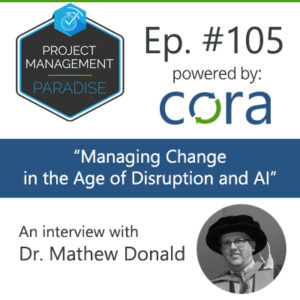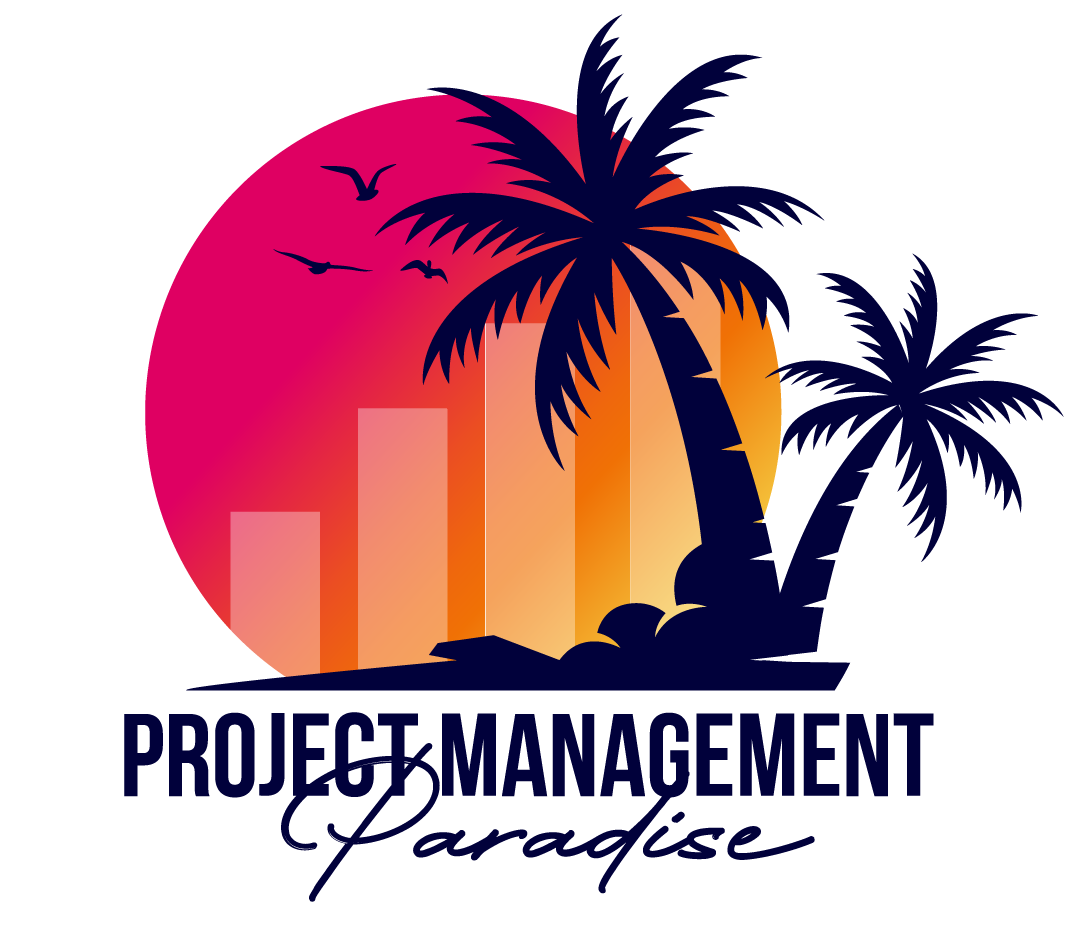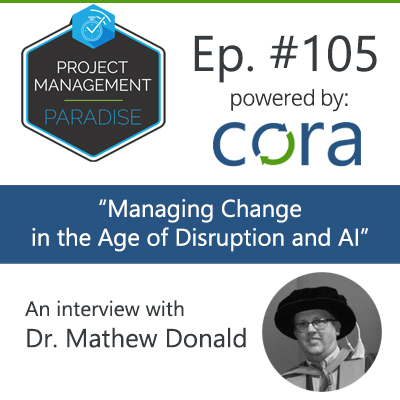In this interview, Dr. Mathew Donald discusses managing change in the age of disruption and AI. As well as being an Academic Dr Donald is also a speaker, consultant and author of “Leading and Managing Change in the Age of Disruption and Artificial Intelligence”.
This episode is sponsored by Cora Systems: Powering best-practice enterprise PPM is over 50 countries. Find out more at corasystems.com
Subscribe to Project Management Paradise via one of the links above or on the right and you’ll automatically receive new episodes directly to your device.
Transcript from Episode 105: “Managing Change in the Age of Disruption and Artificial Intelligence”
So you have quite extensive experience, over 35 years of experience working across projects in various verticals of industry, mining, defence, cosmetics, etc. Tell us a little bit about how you got into project management and how that led to you publishing your most recent book entitled “Leading and Managing Change in the Age of Disruption and Artificial Intelligence”?
 I started working in the early 1980s. I started from a finance background but quickly, back then computers were taking off and my experience started with managers and computers but we had recessions and my career spans into a number of the industries. What I must say in across the time is that there is a great need in business to manage projects successfully and they’re quite often not successfully managed or the outcomes are not as successful as what people have first imagined.
I started working in the early 1980s. I started from a finance background but quickly, back then computers were taking off and my experience started with managers and computers but we had recessions and my career spans into a number of the industries. What I must say in across the time is that there is a great need in business to manage projects successfully and they’re quite often not successfully managed or the outcomes are not as successful as what people have first imagined.
In trying to understand it more formally, I studied and mastered project management and as part of that, I was riding a change management program for very old business. And I had to handle a lot of resistance to change if it’s in it and from that you know, I’ve done a Ph.D. in management leadership in change, trying to understand what really makes a change successful or not. From that, my book came about because I really believed that some of the information that I’ve got out of my Ph.D. regarding how change factors interrelate is very important to the project management field.
I presented a couple of times to the Australian Institute of Project Management on the same topic. I guess what it’s about is, it’s very easy for people to say that change management is just a simple one or two things to look for but my research after interviewing 25 change managers from around the world in a major survey, I found that there’s a number of factors that tie back to leadership and the leadership and management in particular that make the whole change management seem much more complex than what the past 70 years of research may be as indicated.
And what I found lines up with some of the course from people more eminent than myself, regarding how the change might need to be looked at in the future. And then when you position that information with what is happening in the real world, I have called that the disruption and I guess a disruption seems to come from a term that was more related originally to technology but today disruption is more a boiler topic.
It’s one that’s related to the fact that we have globalization in the last 20 years is made all the organizations much more interconnected but when you put that in light of social media and a number of other changes happening pretty much regularly these days, means that change happens fast and with a great deal of uncertainty that makes it really difficult for a project manager to have all the facts in front of them. So that’s what led me to write this book is that I see there’s a great need for the manager of the future, for the leader of the future, and I use those two terms separately, but to understand what the future holds, will change some of the fundamentals of leadership and management that will be challenged in this new environment.
What about the company’s locations and how artificial intelligence is changing the workplace and the company’s business strategies?
The environment for the staff, in particular, will be a challenge quite considerably, so the way that we have already been challenged is that with globalization, the organizations go across different boundaries, have cultural differences, language differences, socio-economic differences which means that communication between individual staff members, between different parts of an organization, will be much more complex and so it is quite possible that someone will pick up the phone or send an email to someone in a completely different country and this is what will happen on pretty much on a daily basis in the larger companies.
And there will be challenges in understanding what each other are talking about, even if we talking the same language, just turn the differences. But with artificial intelligence and technology more generally, the change will happen really fast. As we’re already seeing on pretty much a daily basis, the presidential tweets might just be announced and the question for the manager of the future is – do I react to that tweet or do they wait for more information or do they go and seek more data is really becoming very difficult in the future to manage with such great uncertainty.
Managing in the past has generally been fairly conservative, organizations liked to have clean paths and certainty so that when they present something to a board they can be certain if the board approves that they can implement it. Whereas right now, there is a fast pace and the uncertainty of the changes. If you’re a project manager proposing something to your board, the new project or make a change to your project, literally at the time that price’s approval when the project starting it could actually become irrelevant before you can start.
The flow and effect of that have on a leader in a project or a manager in a project. Your trust factor may be considerably weakened and base with your board and your senior managers as well as your staff because at one point you’ve been promising something, some sort of project and yet at the other end you could find it with the fast pace of change that you’re having this change direction fairly quickly. And that leads to having a different set of staff in the future that as artificial intelligence has a great potential to remove whole industries and wipe out a lot of jobs.
The challenge for the project manager of the future is how to manage less staff that have to be more flexible because of this fast and uncertain future and yet not lose the stuff that you might need keep your project running. The challenge for the manager is to manage to that with less people, yet the people that you left will more likely have high skills and high demands than in the past. The way you will be leading people in the future won’t be so much directing and telling, it’ll be more about some consoling with your stuff, making sure they’ve got good skills, good conditions and some of them would want to work remotely.
The nature of your staff will be so in critical to your organization even though the artificial intelligence or robots are taking over, a lot of the other functions of your project is going to be very dependent on these few people that are going to be left. And how you manage them will have to be different because if you just, in the past promising something and delivering, the nature of the tweets and change and even Brexit, we could say right now, you know, would you set up your business in the UK or in France for instance or would you just avoid the region because it’s too uncertain.
What trading arrangements will you end up within 12 to 30 months time is really uncertain. So some of the old managers who like certainty may just avoid the region, yet someone who’s perhaps a bit more able to handle the risk and a bit more creative might find the opportunity in this. The future of organizations and losing staff in industries is a risk but there’s also a great potential for organizations to find places and opportunity that the big players might find the just too risk-averse or too slow to take that opportunity. The future has great volumes of data but that data may be difficult to understand, it might be incomplete.
Managers in the future will need to be much more flexible and be able to work through that uncertainty. Whereas, historically, they would have been shied away from it and because I don’t think you’re going to be able to avoid it because change can happen in New York today and through social media in all sorts of other media, it could be apparent the next day somewhere else in the world and you may not be able to avoid that impact.
But at the same time, you may not be able to validate data and that’s where in the book I do talk about the potential for, you know, we’ve lost a lot of journalism, I’ve lost them for years but I see the larger organizations may take some of those skills to be able to validate stories and being able to get through to the truth. Because the manager that doesn’t have all the information still needs to make the decision and if they all don’t make a decision then there’s an opportunity for the people that can make decisions, but there’s also a potential loss of earnings, loss of the whole organization if you make a bad decision.
How can you identify somebody who can work with uncertainty and why is it more important to hire people who can work with this kind of uncertainty that we have in the workplace?
We need to have people who can be able to find the data that’s missing or be able to analyze and make good judgments. But the uncertainty will make it difficult even for an employer to decide and you know, to do something or not do something because there might be something you can come up through the data that says now I need to turn this thing on or to turn this thing off. With some uncertainty, they might be stuck in the middle whereas if we can actually build people with good analysis skills, good problem-solving skills, people that have creativity, they might be able to make decisions that are rational and timely.
Because time is an important part of decision making that will be affected by the future because there’s no point necessarily to react to a presidential tweet if in fact the stock market is up and down in that time period and you’ve missed an opportunity. Time and creativity of things are very important, but at the same, they are challenges for the governments and organizations because if you end up hiring people that are totally creative and totally entrepreneurial, you risk that they will make fast decisions without enough data. So there are challenges for the managers and the boards of how they going to interact and what sort of delegations they will set in the future because the why that is done an organization is probably too slow for the world that we are moving into.
Is it important to make the mistakes or do we just think beyond that to find a balance between conservative thinking and creative reactive management?
There is no way you can eliminate risk entirely, so there will be a risk but there’s also uncertainty in terms of information direction. When you think of the trade wars between the US and China or the US and Europe at the moment, it’s really hard to know whether the USA will come up with the deal and it’s all good again or whether those fences will stay there for a long period of time.
A manager who maybe is doing us a large steel contract with either country at the moment, very difficult to be able to determine the right or the wrong and I guess that’s where the way I see the way organizations will work in the future is that they will have to be more dynamic and they will have to be partnering with their staff and their customers, all their stakeholders fairly closely. If there happens to be a major change because of this uncertainty, that the stakeholders don’t mark the management down too much because they just they’ve lost trust.
So truly, to me, because trust is the really critical factor in the way organizations change, the manager of the future will have to be open to take advice from a whole range of stakeholders and staying close to them. So rather than doing the strategy once a year in a closed room and take it to the board and then just starting on it. The strategy has to change much more regularly and has to take much more input from a whole range of stakeholders so they’re not surprised when the business changes direction fairly regularly.
In May 2019, there is a trade war going on between the USA and China, with the Huawei and Google, tell us a little about that, Matthew, please and how does pertinent to managing the business in an age of disruption because the ripple effect from that is huge across many industries across many countries?
We have got the potential for 5G to enable artificial intelligence and robotics to really accelerate across all industries fairly quickly. And yet, when we have that issue between China and America, it means that we won’t have the sharing, that we won’t have the economies of scale, there will be technology differences because while we might have to buy alternative technology to what’s been bought out of the USA or vice versa. We could see that these paths could move in different directions for long periods of time and then for a global organization that maybe is wanting to trade in China and in American simultaneously it’ll be quite costly and difficult to the work out which technology should it use, you know.
Imagine the embarrassment of even having a mobile phone working in America and then flying to China and then they are not working, you going to buy a new one. There is a whole lot of complexity that managers have to work through today. I talk about it in the book. Even the choice of vehicles, you know, if you are buying a brand new vehicle or you had a courier company would you go for electric cars, would you go for a diesel car particularly after the diesel issues or would you wait for some other future technology to come along.
The business will become more expensive and business will become more complicated and managers of the future will definitely need to be able to handle this complexity more isolated before globalization. You could pretty much operate a business or a project in isolation and just achieve what you want to achieve. But things are much more integrated now and that’s what’s causing the fast pace but it’s also causing the uncertainty as well.



